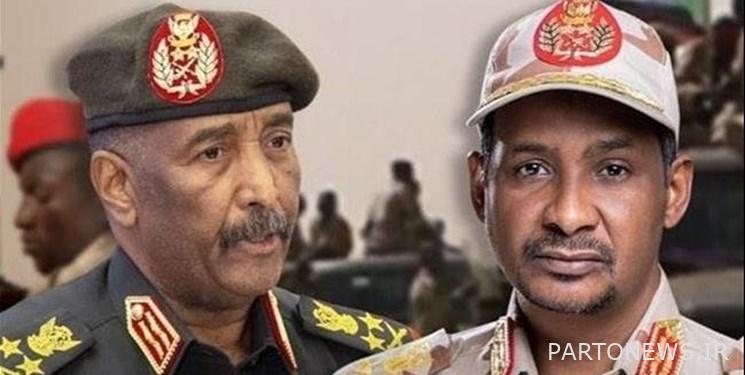Emirati media: Hamidti and Al-Barhan meet

According to the report of Fars International News Agency, the Emirati news site “Al-Sharq” today (July 7th) quoted knowledgeable sources and announced that the IGAD quadrilateral group (consisting of four foreign ministers of Kenya, Ethiopia, South Sudan and Djibouti) will meet on Monday next week. has set as the time for a direct meeting between the two military commanders involved in Sudan.
Al-Sharq wrote: The IGAD group is going to hold a direct meeting next Monday, July 10th, between “Abd al-Fattah al-Barhan”, the head of the Sudanese governing council, and “Mohammed Hamdan Daghlo” (known as Hamidti), the commander of the rapid support forces, in Addis Ababa, the capital of Ethiopia.
This quadrilateral group includes the foreign ministers of Kenya, Ethiopia, South Sudan and Djibouti; The group that earlier and in June, during its meeting in Djibouti, suggested that a direct meeting be held between Al Burhan and Hamidti.
Since April 15, violent and extensive clashes between the Sudanese army and the rapid support forces have been going on in separate areas of Sudan, most of which are concentrated in Khartoum, the capital of this country, and hundreds of civilians have been killed and wounded. Currently, there are no official statistics of civilian casualties or the number of military casualties on both sides of the military conflict.
So far, Saudi Arabia and the United States, during their mediation between the conflicting parties, held talks in the Saudi city of Jeddah for a ceasefire agreement between the Sudanese army and the Rapid Support Forces; However, press reports indicate violations and violations of the ceasefire by both sides of the conflict.
After a period of relative calm, it was on Sunday (June 25) that the clashes between the Sudanese army and the Rapid Support Forces resumed for the second consecutive day in the vicinity of the headquarters of the Central Reserve Command in the south of Khartoum. In these tensions, the army forces bombarded the Sudanese capital with artillery at the location of the support forces in Al-Manshieh Bridge in the east of Khartoum. The army also carried out heavy air and artillery attacks against Rapid Support Force bases in Halfaya, north of Khartoum.
It was two weeks ago and before the resumption of conflicts, that “Faisal Bin Farhan”, the Minister of Foreign Affairs of Saudi Arabia, in separate phone calls with the commander of the Sudanese army and the commander of the rapid support forces, emphasized the importance of observing the ceasefire in this country. During those calls, Benfarhan had repeated Riyadh’s request for the return of peace to Khartoum, giving priority to national interests, the lack of severe military tension, and resorting to a political solution to establish security and stability for Sudan and its people.
Saudi Arabia had previously announced its intention to hold a political meeting to support Sudan, with the participation of Qatar, Egypt, Germany and the presence of representatives of some international organizations. The Saudi Foreign Ministry announced that the country will hold a joint meeting at a high political level to declare its commitment and support for humanitarian aid to Sudan and the region; An action that was not carried out due to the continuation of military conflicts and violation of the ceasefire.
After African countries were disappointed with the cessation of conflicts in Sudan, on Friday, June 23, “Salva Mayardit”, the president of South Sudan, held an emergency meeting of the army and security leaders to discuss the situation in Khartoum, and issued an order to close the borders with Sudan. Because this crisis has created widespread violence in the Darfur region, western Sudan, and has resulted in the escape of more than 2.5 million Sudanese people.
end of message/
You can edit this article
Suggest this article for the first page

